- Actuaries
- Attorneys
- Bankers
- Corporate managers
- Cost analysts
- Engineers
- Software developers
- High school teachers
- Physicians
- Professors
Mathematics
- Bachelor of Arts
- Bachelor of Science
- Minor
- Teacher Certification Content Area
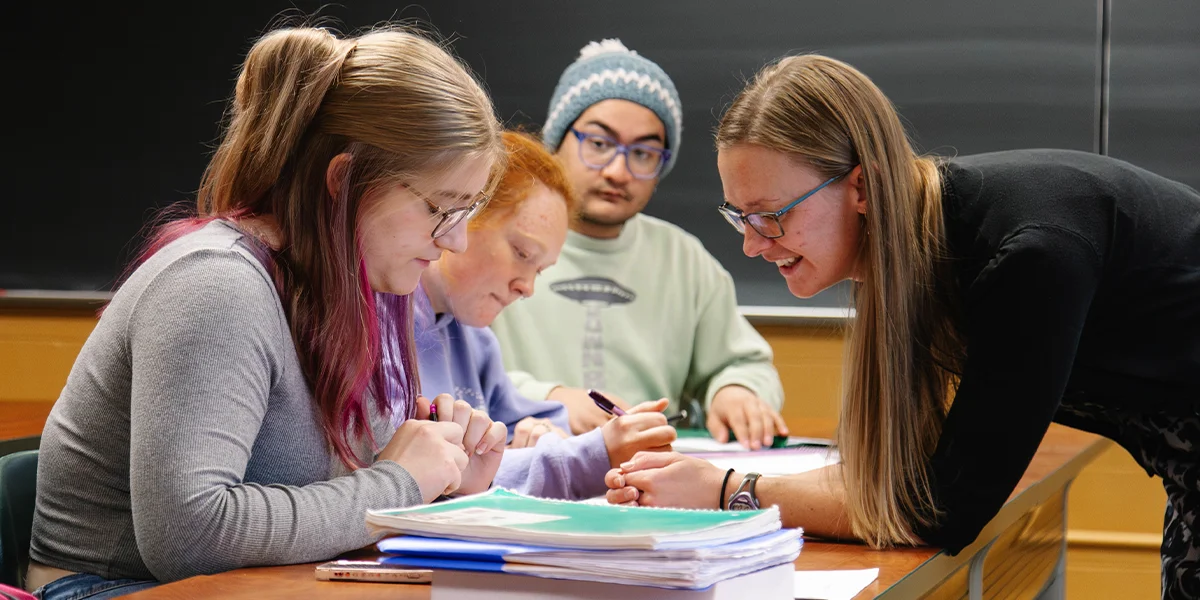
-
In This Section
- Business Administration
- Health and Physical Education
- Sports Management
- Accounting
- Addiction Specialist
- Art History
- Biology
- Biochemistry
- Biological Psychology
- Biotechnology
- Business Data Analytics
- Chemistry
- Education: Children's Literature
- Children's Studies
- Communication and Media Studies
- Computer Science
- Creative Writing
- Criminology, Law, and Society
- Cybersecurity
- Data Science
- Digital Art And Media
- Economics
- Education Degrees and Certificates
- Education: Elementary Education PK-6
- Education: Disability Studies - Special Education
- Education: Secondary Grades Education 7-12
- Education: Middle Grades Education 4-8
- Engineering
- English
- Entrepreneurship
- Environmental Chemistry
- Environmental Science
- Finance
- Forensic Studies - Financial Investigations
- Forensic Studies - Cybersecurity
- Forensic Studies - Natural Science
- Global Engagement
- Global Security
- Health Science
- History
- Information Systems
- International Business
- International Studies
- Legal Studies
- Liberal Arts
- Literary Translation
- Management
- Marketing
- Mathematics
- Mathematics/Actuarial Science
- Mathematics and Engineering
- Medieval Studies
- Music Studies
- Music Performance
- Management: Operational Excellence
- Peace and Justice Studies
- Philosophy
- Physics
- Political Science
- Psychology
- Public Administration
- Public Health
- Public History
- Public Policy
- Sociology
- Spanish
- Studio Art
- Theology
- The SAP Business One Program
- Explore Undergraduate Degrees
- Undergraduate Programs Schools Index
- Sustainability and Integral Ecology
- Classical Thought
- Sanctity of Life Minor
- Nursing
- Entrepreneurial Success
- Hospitality
- Nonprofit Studies
- Organizational Leadership
- Project Management - Undergraduate
- SAP University Alliance
- Supply Chain
- Aviation Management
- Anthropology
- Data Analytics
- STEM Education
- Legal Practice
- Physics Education
- Education: Psychology Education
- Business Economics
- Mathematics and Economics
- Exercise Science
- Finance and Mathematics
- Public Relations
Discover the Beauty and Versatility of Mathematics
Mathematics is a study of patterns that involves both rigor and creativity, revealing its inherent beauty and powerful applications. Majoring in mathematics provides students with a strong foundation for various fields of study, fostering critical thinking skills that extend beyond the classroom. Through their studies, students can appreciate the logical structure of mathematics to search for truth and beauty, while also preparing for diverse and impactful careers. Students can pair their degree with a second major or a minor in data analytics, finance, economics, or education, to name a few.
Mathematics Secondary Education:
The secondary math education certification program closely mirrors the mathematics program but includes preparation for certification to teach at the secondary school level through collaboration with the Department of Education. Students gain a deep understanding of mathematical proofs, logical structures, and solutions to concrete and abstract problems while also developing the skills necessary for effective classroom instruction. Those interested in pursuing secondary education certification can learn more here: Education Certification: Grades 7-12.
Contact
Daniele Arcara
Office Phone: 724-805-2934
Email: daniele.arcara@stvincent.edu
Explore Undergraduate Degrees
Undergraduate Admission
Phone:
800-782-5549
Ext. 2500
Email:
admission@stvincent.edu
Program Highlights
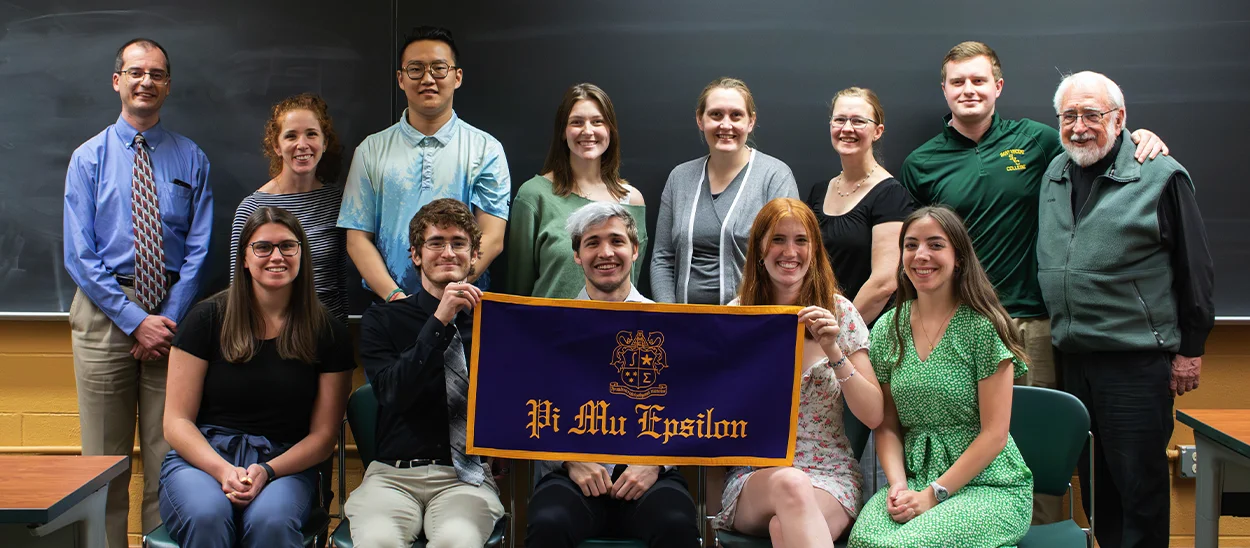
Pi Mu Epsilon
Every year, the math department inducts new members into Pi Mu Epsilon, a national mathematics honor society. We recognize and celebrate outstanding achievement in the field of mathematics among our students.
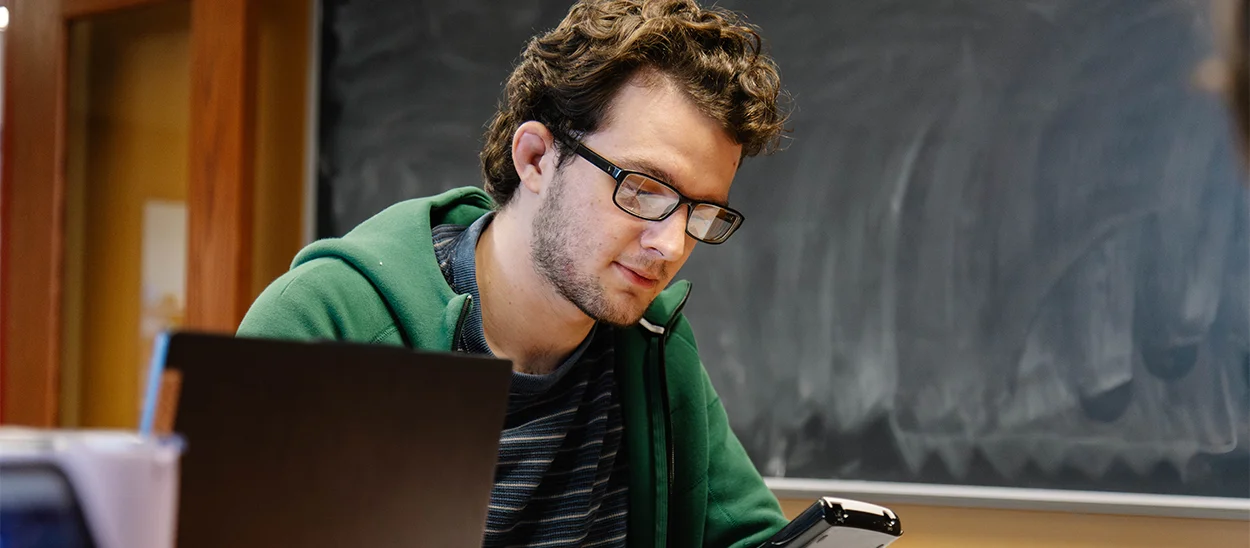
The Putnam Competition
Since 2016, SVC students have participated in the William Lowell Putnam Competition, regarded as one of the most challenging mathematics competitions for undergraduate students in the US and Canada. Students employ abstract reasoning, problem-solving, and mathematical tools to tackle rigorous problems ranging from a variety of topics such as group theory, graph theory, number theory, and set theory.

Excellent Faculty
Our full-time faculty have PhD degrees in mathematics and are active in their research, publishing in national and international refereed math journals and joining intensive pedagogically focused workshops. Several of our professors are part of the Mathematical Association of America’s Project NExT which gives our faculty access to resources and a community of other mathematicians devoted to teaching.
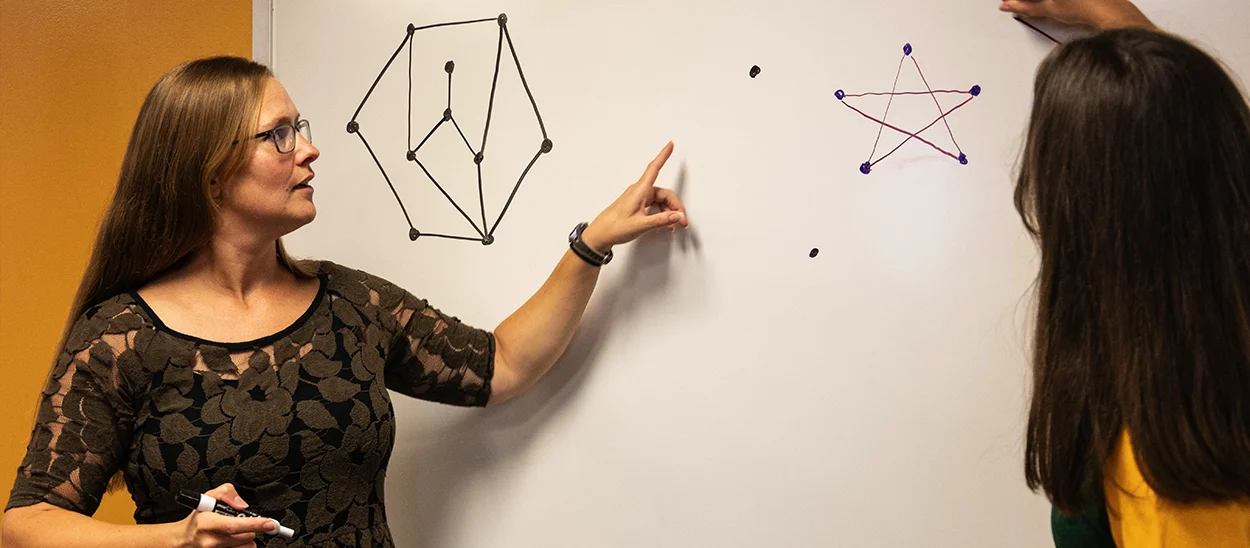
Field Experiences for Math Education Majors
Starting freshman year, students engage in field experiences that build essential skills in diverse settings. Integrated with coursework, these experiences allow immediate application of educational theories. Opportunities include the Bearcat B.E.S.T. program, environmental education at Winnie Palmer Nature Reserve, lesson planning for homeschooling students in our STEP-Up program, and immersive co-teaching. By their 14-week student teaching internship, students are fully prepared to lead. Learn more details about our educational field experiences.
Careers after Saint Vincent
A degree in mathematics opens doors to a wide range of careers. Our advanced courses foster higher-level thinking and problem-solving skills, equipping students with the analytical abilities needed to tackle complex problems in various fields. As a result, math majors find employment in diverse areas, leveraging their systematic reasoning to excel in multiple career paths.
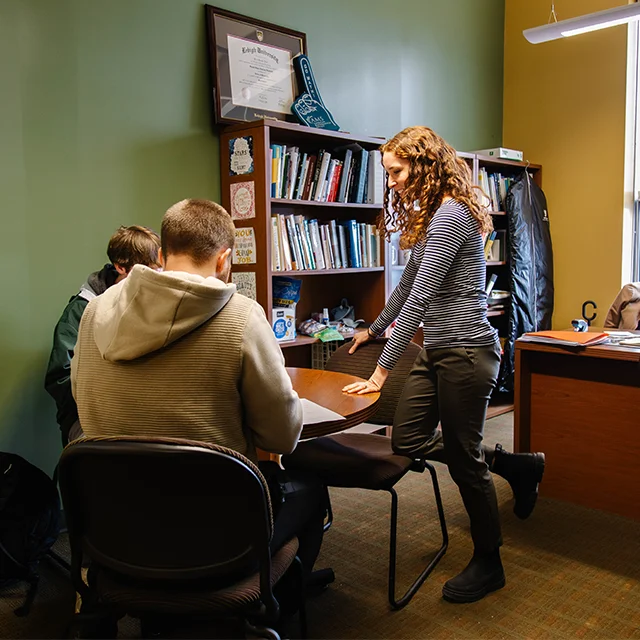
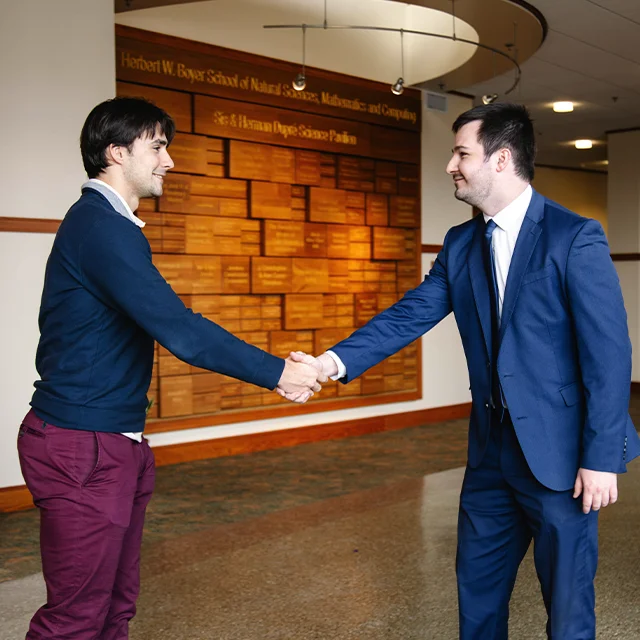
- BNY Mellon
- Various local and out-of-state high schools
- Talcott Financial Group
- PNC
- Northwestern
- Notre Dame
- University of Pittsburgh
- UNC-Chapel Hill
- US Navy
- Syracuse
Student Spotlight
-

Emily Hoover C’19
“Deciding to attend Saint Vincent College was undoubtedly the easiest and best decision I have made. I enjoyed being challenged and exposed to different variations of the mathematics field. As a commercial credit analyst, I evaluate the creditworthiness of businesses and individuals applying for commercial loans. I wouldn’t be where I am today without the education I received during my time at SVC. It not only helped prepare me for a career utilizing my mathematics degree, but it also helped to prepare me for life after college.”
Commercial Credit Analyst, Somerset Trust Company
-

Zachary Schuler C’20
“My time studying math at Saint Vincent was priceless. I had the chance to take a wide variety of classes. Whether it was a calculation heavy class like Differential Equations or a theory-focused class such as Graph Theory, being surrounded by like-minded and motivated peers provided the perfect environment for me to develop my mind and problem-solving abilities. In addition, the opportunities provided by the math club and the math faculty were essential in developing the toolset that I use throughout my career.”
Senior Software Engineer for PNC bank
-

Emily Bosche C’23
“Even though I took the psych route after SVC, the curriculum in the math department has been extremely applicable in the work I've done. I've applied concepts from C++, Linear Algebra, and both Probability and Statistics courses to my psychology coursework assignments, data analysis, and exploration.”
Doctoral student, Social Psychology Program in the Conflict Resolution Lab, University of Pittsburgh
Required Curriculum
The mathematics major is part of The Herbert W. Boyer School of Natural Sciences, Mathematics, and Computing and is supported by our core curriculum, where students delve into diverse academic subjects at both foundational and advanced levels to explore how different disciplines connect, fostering deeper self-understanding and proficiency in their chosen field of study.
-
Required Courses
Requirements for a Bachelor of Arts Degree in Mathematics
Major Requirements (41 or 43 Credits)
MA 111 Analytical Calculus I
MA 112 Analytical Calculus II
MA 211 Analytical Calculus III
MA 212 Ordinary and Partial Differential Equations
MA 251 Linear Algebra
MA 231 Methods of Proof
MA 501 Capstone IThree other MA courses at 200 or 300 levels
(3 credits each)**Two MA courses at 400 level
(4 credits each)One of these courses:
CS 110 C++ Programming I
CS 190 Programming Language Lab: Python
CS 270 Introduction to Numerical Computation
ENGR 115 Intro to Engineering ComputationTake four credits of Natural Science and Lab:
BL 150 /151 General Biology I and Lab
BL 152 / 153 General Biology II and Lab
CH 101 / 103 General Chemistry I and Lab
CH 102 /104 General Chemistry II and Lab
PH 111 / 113 General Physics I and Lab
PH 112 / 114 General Physics II and LabRequirements for a Bachelor of Science Degree in Mathematics
Major Requirements (60 or 62 credits)
MA 111 Analytical Calculus I
MA 112 Analytical Calculus II
MA 211 Analytical Calculus III
MA 212 Ordinary and Partial
Differential Equations
MA 251 Linear Algebra
PH 111/113 General Physics I and Lab
MA 231 Methods of Proof
MA 501 Capstone I
MA 502 Capstone IIFour other MA courses at 200 or 300 levels
(3 credits each)Four MA courses at 400 level (4 credits each)
One of these courses:
CS 110 C++ Programming I
CS 190 Programming Language Lab: Python
CS 270 Introduction to Numerical Computation
ENGR 115 Intro to Engineering ComputationTake four credits of Natural Science and Lab:
BL 150 / 151 General Biology I and Lab
BL 152 / 153 General Biology II and Lab
CH 101 / 103 General Chemistry I and Lab
CH 102 / 104 General Chemistry II and Lab
PH 112 / 114 General Physics II and LabMinor Requirements
(At Least 18 Credits)
MA 111 Analytical Calculus I
MA 112 Analytical Calculus II
MA 211 Analytical Calculus IIITwo more courses at 200+ level (6-8 credits)
Teacher Certification Requirements
All students who are interested in pursuing the teacher certification should contact the chairperson of the Education Department at their earliest possible convenience (see additional information under the Education Department). Students must also declare their Education minor in the Registrar’s Office. The required Mathematics courses would be MA 111, MA 112, MA 211, MA 212, MA 231, MA 251, MA 301, MA 311 or MA 241, MA 421, MA 451, and MA 501. Other courses in other disciplines are also required. -
Key Courses
The mathematics major instructs students in precise, detailed work, following multi-step procedures, and building logical reasoning skills. Advanced courses push students to see mathematics as more than numeric computations, expanding their ability to consider multiple viewpoints and approaches to problem-solving and learning.
History of Mathematics
This course is a survey of mathematics from ancient times to modern times and looks at the historical context and implications of various mathematical discoveries, in addition to exploring the lives of the mathematicians responsible for these breakthroughs. Topics include ancient counting systems, Euclidean and non-Euclidean geometry, and introductory number theory.Calculus Sequence
In the calculus sequence, students explore the concept of "arbitrarily small" and learn to sum infinite series, enabling students to calculate instantaneous rates and areas under curves, study differential and integral calculus, and understand their inverse relationship. These courses reveal the beauty and power of calculus in understanding the world.Statistics Sequence
This two-semester sequence of courses covers the foundations of statistics. Topics include laws of probability, probability functions, confidence intervals, hypothesis testing, and linear regression. Students build statistical models and develop skills for implementing regression analysis in real-world problems. In the second semester, students complete projects that culminate in a presentation at our SVC Academic Conference.Graph Theory
This course focuses on Graph Theory, which had its origins in the Königsberg Bridge Problem solved by Leonard Euler in 1735. Besides its current value as an exciting, accessible branch of mathematics, it has multiple applications in chemistry, operations research, social sciences, and computer science.
Our Faculty

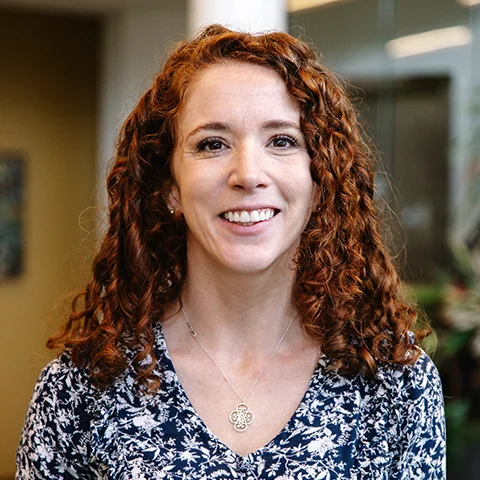
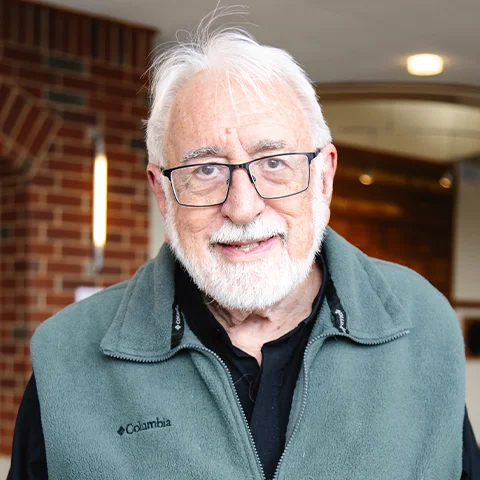
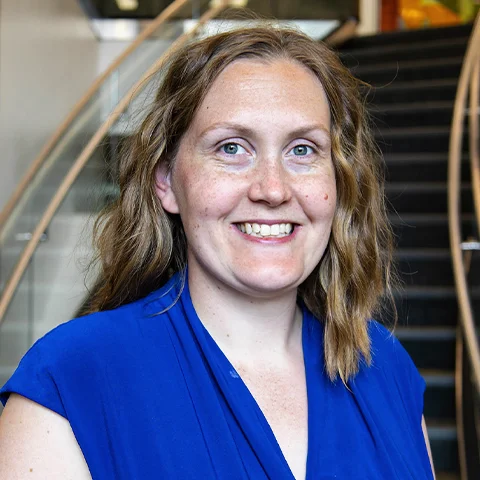

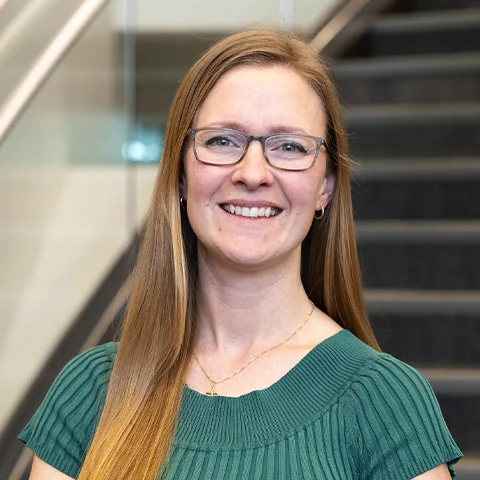
Resources and Facilities
-
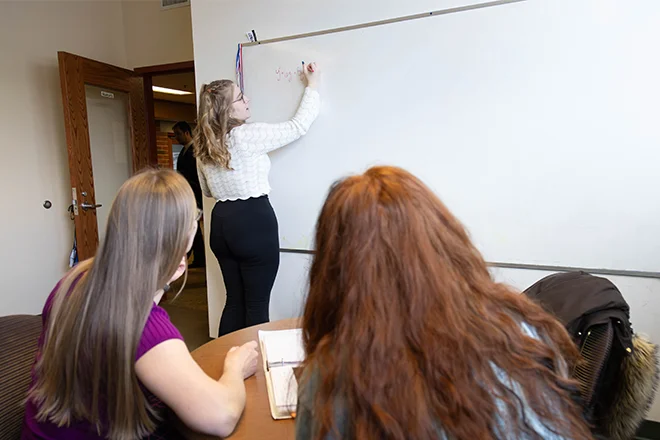
Collaborative Learning Program (CLP)
The CLP is a weekly study hour for specific math courses where students exchange ideas with knowledgeable upperclassmen and classmates in a relaxed and enjoyable setting, while attaining better insight and skill at solving problems covered in course content.
-
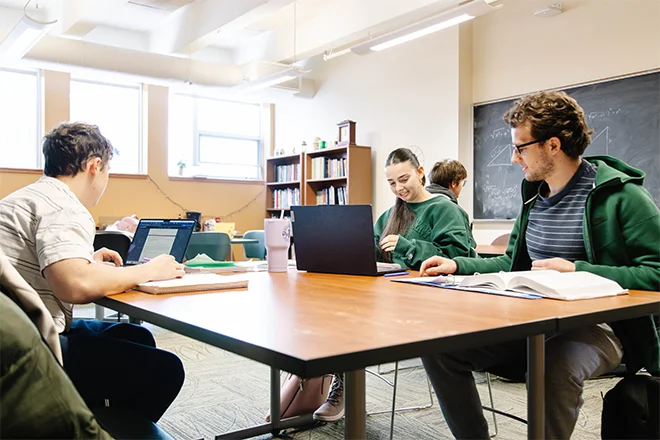
Math Tutoring Room
The math tutoring room is staffed by student tutors throughout the week. This free service is available to all students seeking help with their math courses. It's also a fantastic work-study opportunity for upperclassmen, allowing them to gain valuable experience while supporting their peers.
-
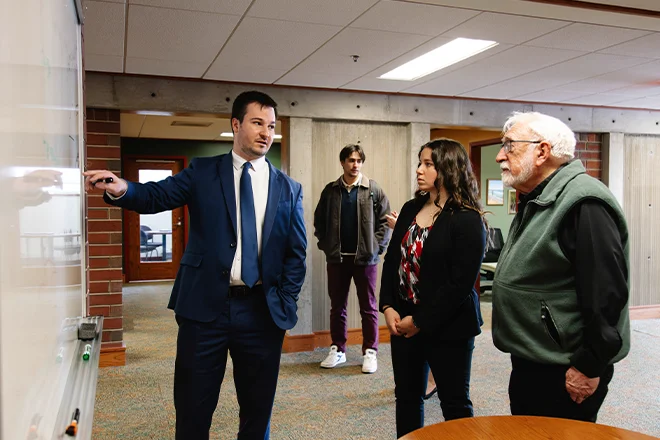
Tenley Hall
Located in the state-of-the-art Sis and Herman Dupré Science Pavilion, our math department offers a stimulating and collaborative environment. Sharing a floor with the computer science department and with the physics department just downstairs, students have ample opportunities for interdisciplinary collaboration. Our space features faculty offices, cozy sitting areas for informal study sessions, and a spacious tutoring room staffed by upperclassmen.
Explore Undergraduate Degrees
Undergraduate Admission
Phone:
800-782-5549
Ext. 2500
Email:
admission@stvincent.edu
